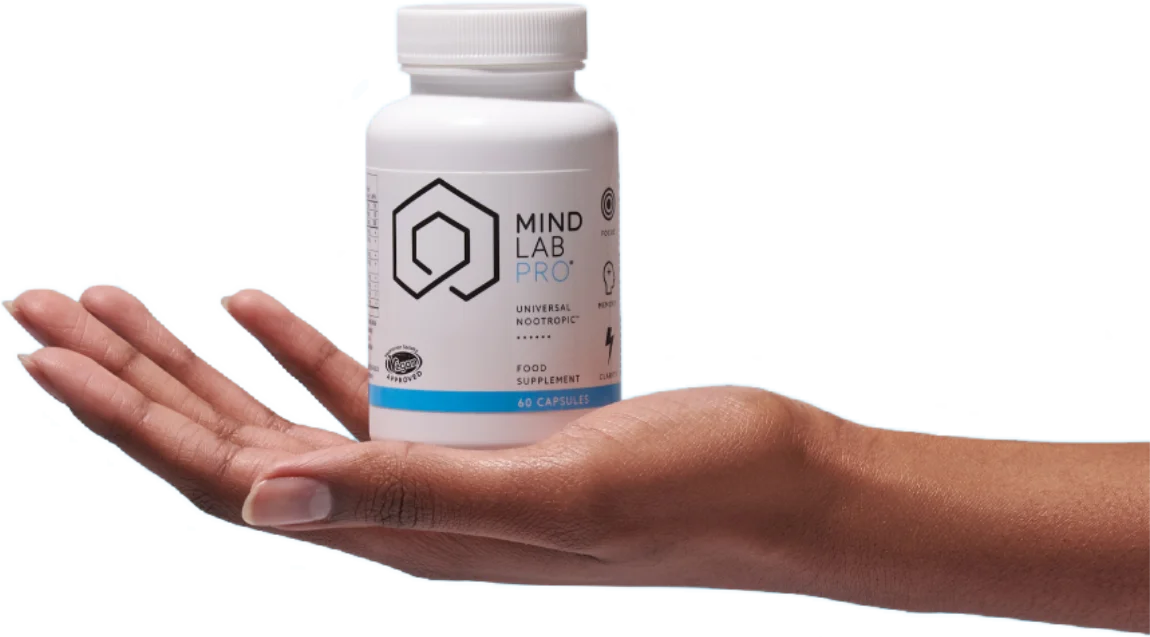Want adaptogenic energy—more steady stamina and resilience, not a jittery spike-and-crash? This top-10 list ranks popular adaptogenic herbs (and how people actually use them) for supporting energy, fatigue resistance, motivation, and stress performance. You’ll learn what “energy” means in adaptogen terms, which herbs are better for physical vs. mental fatigue, and how to match an adaptogen to your pattern (burnout, low drive, overwhelm, or poor recovery). You’ll also get simple guidance on timing, stacking, and what to look for in quality extracts.
Looking for a caffeine-free way to boost your vitality naturally? Adaptogens for energy might be perfect for you. Adaptogens are natural substances considered to help the body adapt to stress and to exert a normalizing effect upon bodily processes.
In this article, we will detail what adaptogens are and what they do. We provide a list of the major adaptogen herbs, and then go in-depth on which adaptogens are most effective for naturally raising energy levels. We will conclude by recommending high-quality supplements that supply some of the best adaptogens for energy. Let's get to it!
Key Takeaways
- Adaptogens support energy by helping the body adapt to stress—primarily via the HPA axis—promoting steadier, crash-free vitality.
- They’re different from stimulants: effects are subtle and cumulative, best for all-day consistency rather than quick spikes.
- Top energy adaptogens here include: Rhodiola (mental/physical endurance), Bacopa (brain energy/clarity), Cordyceps (athletic performance), Ashwagandha (stress-resilient energy), Ginseng, Licorice, Schisandra, Tulsi, Astragalus.
- Mind Lab Pro® supplies Rhodiola (50 mg) + Bacopa (150 mg) within a broader research-backed stack for cognitive energy under stress.
- Safety note: Choose standardized extracts and follow label directions; consult a healthcare professional if pregnant, on meds, or with health conditions.
What are Adaptogenic Herbs?
Adaptogens are a special group of plants, herbs and mushrooms that are believed to help our bodies manage stress better. They primarily work by supporting our adrenal system, which is responsible for managing how our bodies respond to stress.
By helping to keep human body functions in a state of healthy balance, adaptogens may support versatile and far-ranging wellness benefits, helping to optimize cognitive function, immune performance, cardiovascular health, blood sugar balance, physical strength and endurance, reproductive health and more. In this article, we are focusing on adaptogens for energy, specifically.
The concept of adaptogens was first developed by Soviet scientist Nikolai Lazarev in the 1940s. Later, Israeli scientist I. I. Brekhman and his colleague I.V. Dardymov, through research conducted in the late 1960s, established a set of criteria to define adaptogens. They also identified a list of plants that met these criteria.
To be classified as an adaptogen, a substance typically must meet the following criteria:
-
It must be well tolerated and natural for the human body, causing minimal -- if any -- disruption to normal physiological functions.
-
It must work in a non-specific way. Adaptogens are versatile, helping bolster resistance to all types of stressors, emotional, physical, chemical, etc.
-
It should have a "universal balancing" activity. No matter whether a physiological function is overactive or underactive, an adaptogen will help to gently bring that function back into normal range.
The five herbs that were initially identified as adaptogens are:
-
Rhodiola rosea (Golden Root or Arctic Root) - Recognized for its stress relief benefits and ability to increase physical and mental endurance and resilience.
-
Panax ginseng (Asian Ginseng) - One of the most well-known adaptogens, used for centuries in Chinese herbalism to enhance energy, support immune function, and promote overall health benefits.
-
Eleutherococcus senticosus (Siberian Ginseng) - Not a true ginseng but was found to improve endurance and mental performance, particularly under stressful conditions.
-
Schisandra chinensis (Chinese Magnolia Vine) - A berry used in traditional Chinese medicine that is believed to help improve mental clarity and reduce stress.
-
Withania somnifera (Ashwagandha) - Often used in Ayurvedic wellness to boost the immune system, reduce anxiety, and increase energy levels.
Since the early research on adaptogens, some additional herbs and mushrooms -- including good choices for naturally supporting energy -- have joined the list of adaptogens.
Additional Adaptogenic Herbs List
-
Bacopa monnieri: Adaptogen nootropic herb associated with memory and learning; known as Brahmi in Ayurvedic wellness practices and associated with higher states of consciousness
-
Holy Basil (Ocimum sanctum, also known as Tulsi): An herb used in Ayurveda that is believed to act as an immune modulator and antioxidant.
-
Cordyceps: A type of medicinal mushroom believed to increase energy and reduce fatigue.
-
Licorice Root (Glycyrrhiza glabra): Used in traditional medicine to help balance the body's stress response.
-
Astragalus Root (Astragalus membranaceus): An herb thought to boost the immune system and reduce fatigue.
These plants have been used for centuries in different traditional wellness systems around the world and are now widely recognized in Western complementary and integrative health practices (and widely consumed in herbal supplements) for their health-promoting properties.
They continue to be the subject of considerable research, particularly for their potential to improve adaptation to stress and exert protective effects against a variety of stressors.
How do Adaptogens Work?
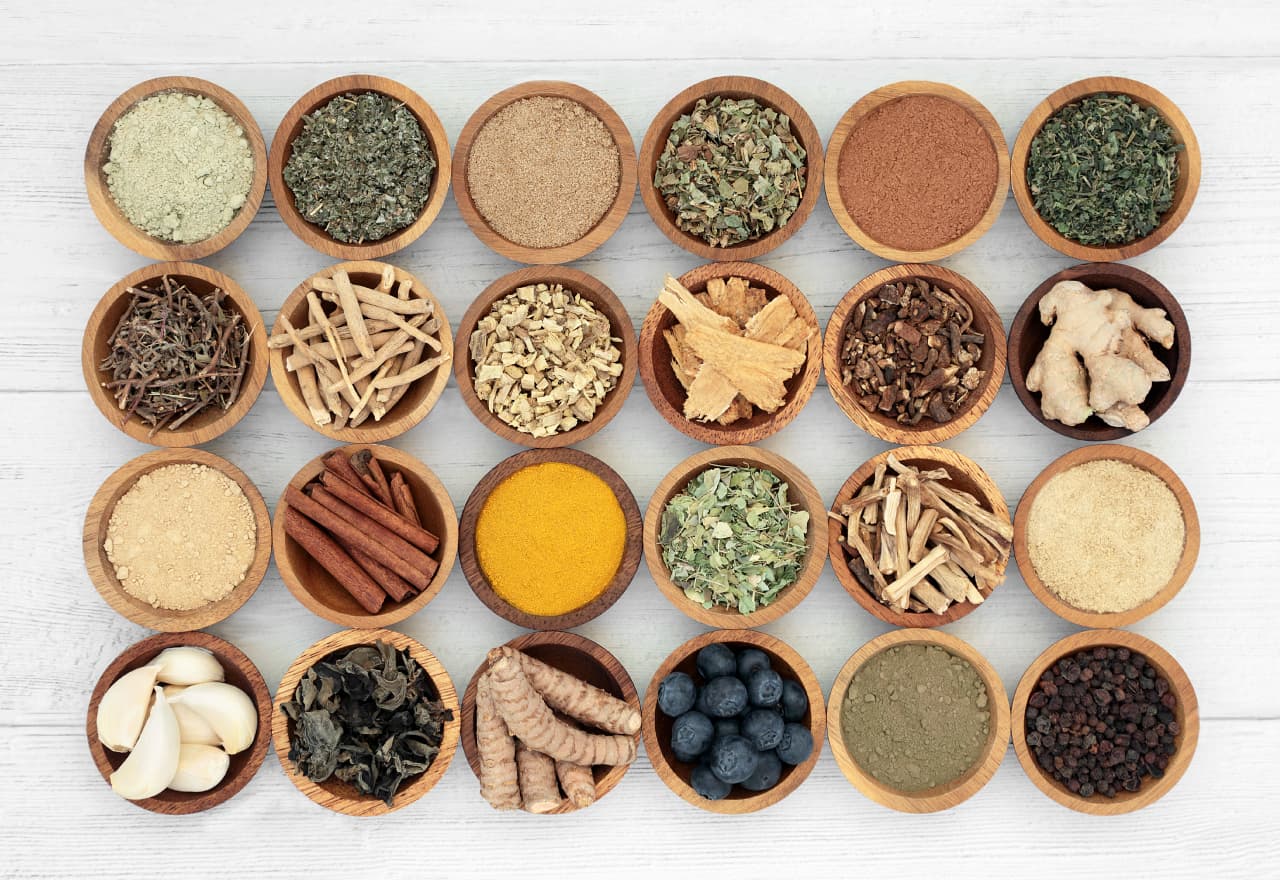
Plant adaptogens work primarily by supporting the body's ability to regulate the HPA (hypothalamic-pituitary-adrenal) axis which controls stress responses and influences several other aspects of healthy function, including digestion, immune systems, metabolic function and mood.
When stressed, the human body produces stress hormones like cortisol. Plant adaptogens (as well as mushroom adaptogens) help promote hormonal balance under stress, bringing cortisol levels and other hormones back to the normal, balanced level known as homeostasis.
Adaptogens don't block stress; instead, they help our bodies react to stress in a healthier way, making us more resilient.
Adaptogens increase stress tolerance while decreasing sensitivity to stressors.
Adaptogenic herbs may help the human body regulate the physical, chemical, and biological effects of stress more effectively. They are thought to stimulate your body's stress-protection response, helping to gently restore body systems back to a healthy, balanced state known as "homeostasis".
How do Adaptogens Boost Energy?
Have you ever noticed that when you are stressed out, you tend to feel fatigue and brain fog?
Feeling tired in response to stress is a common experience, and it's rooted in the body's intrinsic defense mechanisms — a complex interplay between hormonal, cognitive, and physical responses.
When you're stressed, your body goes into a "fight or flight" mode.
This state is triggered by the release of stress hormones, including adrenaline and cortisol, from the adrenal glands. These hormones prepare your body to deal with the stressor by diverting energy to the muscles and vital organs, sharpening your senses, and increasing alertness.
However, this response is meant to be short-lived. In the modern world, stressors can be persistent and non-physical, such as ongoing work pressure, financial worries, or social challenges.
Chronic activation of this stress response can lead to adrenal fatigue, where the adrenal glands become overworked. As a result, cortisol levels may remain elevated, leading to a continuous feeling of being "on edge" and making it difficult for the body to relax and recover. This constant state of vigilance can be mentally and physically exhausting.
Stress can disrupt sleep patterns, as well -- either by making it hard to fall asleep or by affecting the quality of sleep. Poor sleep can significantly contribute to feelings of fatigue.
Stress also affects cognitive and emotional resources. It requires a lot of mental energy to manage worrying thoughts and emotions, which can leave you feeling drained. The brain is an organ that consumes a lot of energy, and when it's working overtime to cope with stress, it can deplete energy levels even further.
Lastly, the body's efforts to sustain the 'fight or flight' response can lead to the neglect of non-essential functions, like digestion and immune response, which can indirectly affect energy levels. If the body prioritizes stress response over normal maintenance and repair, the cumulative effect can manifest as a deep sense of tiredness.
In summary, stress makes you feel tired because it prompts your body to expend energy preparing for an immediate response to danger, disrupts restorative processes like sleep, taxes your cognitive and emotional reserves, and can lead to a state of adrenal fatigue if the stress is prolonged and unrelenting.
Adaptogens' connection to energy levels is primarily through their influence on the body's stress-response system.
But adaptogens also work in several additional nuanced ways to help people feel more energetic. Some of the biological actions associated with adaptogens' energizing activities include:
Modulation of the Stress Response
This is the one big reason why adaptogens help boost energy. Adaptogens help modulate the body's stress response by influencing the hypothalamic-pituitary-adrenal (HPA) axis, which controls the secretion of cortisol and other stress hormones.
By promoting hormonal balance, adaptogens can help mitigate the energy dips caused by stress and support sustained energy throughout the day.

When chronic stress is managed in a natural and healthy way, the body's energy resources are conserved and can be used more efficiently for daily activities.
Some additional ways that adaptogens help to revitalize your energy levels include:
Support of Adrenal Function: The adrenal glands play a critical role in managing energy levels through the release of hormones like adrenaline and cortisol. Adaptogens such as licorice root can support adrenal function, thereby helping to maintain an optimal level of these hormones and prevent the exhaustion that follows prolonged stress.
Enhancement of Mitochondrial Function: The mitochondria are where cellular energy production occurs, converting glucose into adenosine triphosphate (ATP), the energy currency of the cell. Adaptogens like Rhodiola rosea have been suggested to improve mitochondrial efficiency, leading to increased production of ATP and thus more energy available for the body to use.
Improved Sleep Quality: Some adaptogens, including ashwagandha and holy basil, can affect sleep quality by reducing stress and exerting a calming effect on the central nervous system. Better sleep is associated with more effective healing, restoration of body systems, and, consequently, higher energy levels during waking hours.
Boosting Immune System Function: Chronic stress can suppress the immune system, leading to illness and fatigue. Adaptogens like Astragalus can bolster the immune system, reducing the likelihood of sickness and helping to ensure that energy isn't diverted to fight off infections.
Regulation of Blood Sugar: Maintaining stable blood sugar levels is crucial for consistent energy throughout the day. Adaptogens like ginseng can help regulate blood sugar, preventing the energy crashes that accompany spikes and dips in glucose levels.
Increased Physical Endurance and Recovery: Some adaptogens, such as Schisandra and Rhodiola, are noted for their ability to enhance physical performance and endurance, which is vital for athletes or anyone engaged in physical labor. They also help in reducing recovery times and preventing fatigue after exercise.
Cognitive Function and Mental Energy: Adaptogens can also influence mental energy and clarity. Herbs like Bacopa monnieri and Rhodiola rosea have been associated with improved cognitive function, which can translate to feeling more mentally alert and energetic.
Anti-fatigue Properties: Adaptogens often contain compounds that help reduce the perception of fatigue. For instance, compounds in Siberian ginseng have been shown to help the body better cope with exhaustion and tiredness. Burnout patients and those with chronic fatigue syndrome may consider adaptogens for this potential benefit.
Adaptogens vs. Stimulants for Energy

If you are seeking natural energy support, adaptogens are a sensible alternative to caffeine and other stimulants. However, it is worth noting that adaptogens can also be taken in conjunction with caffeine to offset the stress that is created by stimulation.
Adaptogens have different energizing effects than stimulants. Caffeine and other stimulants reliably boost capacity for mental performance and physical exertion, but are almost always followed by a "crash" period where performance declines. Adaptogens, on the other hand, may provide a sustainable performance boost that avoids performance-limiting crashes afterwards.
It is essential to understand that adaptogens are not like stimulants that provide an immediate surge of energy followed by a crash.
Instead, adaptogens work subtly and cumulatively to build and maintain energy levels over time. Adaptogens are most effective when incorporated into a lifestyle that includes a balanced diet, regular exercise, and adequate rest.
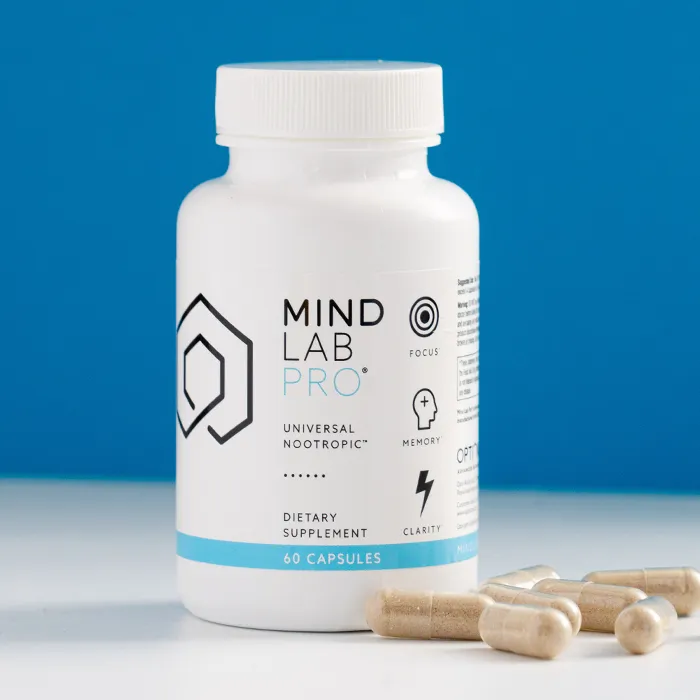
Best Adaptogenic Herbs for Energy
There are over 50 herbs that are considered to be plant adaptogens; in this article we are focusing on the major adaptogens, with an emphasis on those that are associated with energizing benefits. Now let's take a look at how adaptogens work for energy, specifically.
Rhodiola Rosea
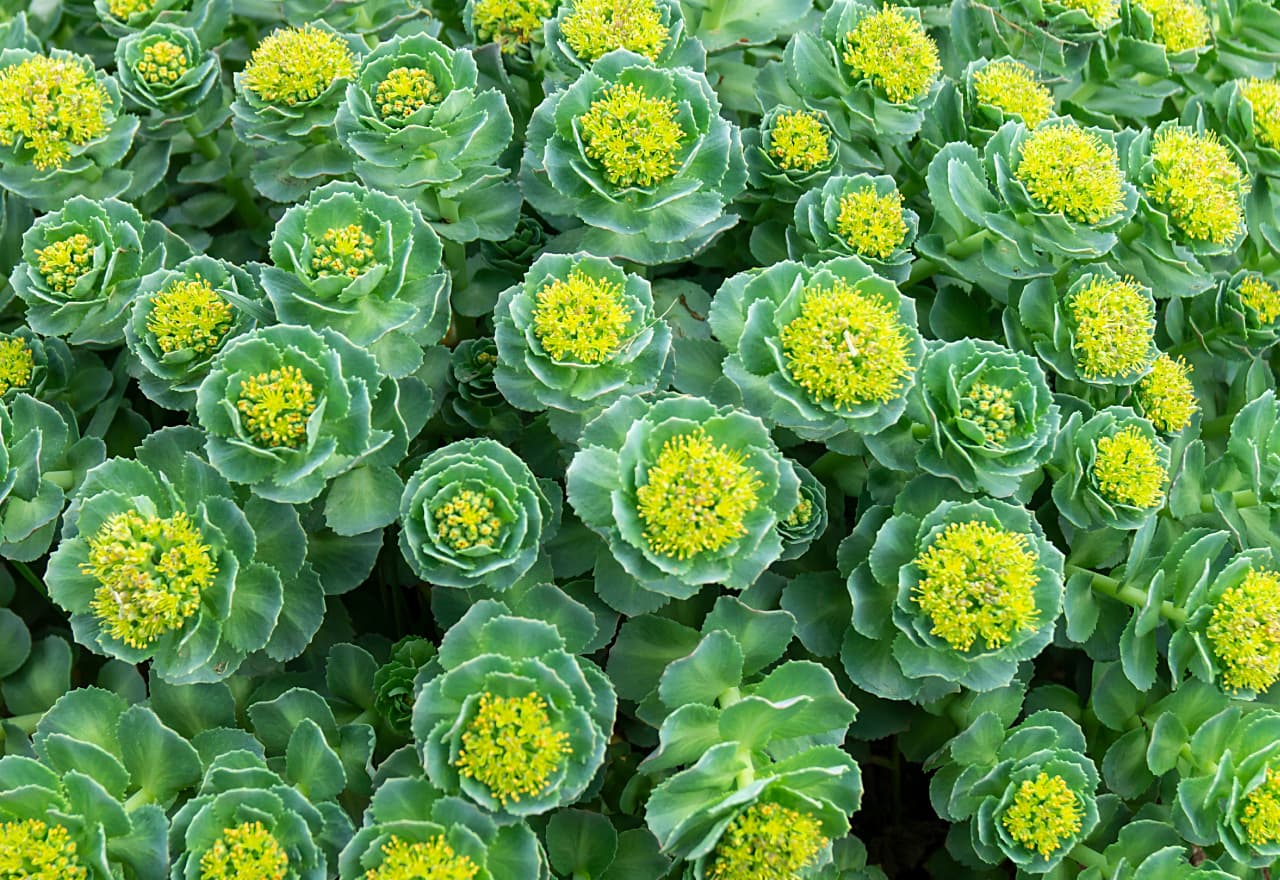
Rhodiola rosea, also known as golden root or arctic root, is a perennial plant that grows in cold, mountainous regions of Europe, Asia, and North America. It has been used for centuries in traditional medicine in Russia, Scandinavia, and other countries to enhance physical and mental performance, reduce fatigue, and improve resistance to stress.
The history of rhodiola rosea in traditional herbalism is rich and varied. The Vikings were believed to have used it to enhance their physical strength and endurance, while the people of Siberia used it to help cope with the harsh winters and stressful life.
Rhodiola boosts work productivity. In traditional Russian uses, Rhodiola was consumed by farmers to enhance stamina and working capacity through long, hard harvest days in cold temperatures.
When word of its revitalizing properties spread to China, emperors sent explorers into Siberia to bring back the root for wellness applications. In traditional Chinese herbalism practices, rhodiola rosea is used for its stress protective activity, to promote longevity and improve overall health.
More recently, in the latter half of the 20th century, Rhodiola (and other adaptogens) were used by cosmonauts and Olympic athletes of the former Soviet Union to enhance physical performance, recovery time, and concentration.
One report suggested that master-level Soviet Union biathletes (Biathlon is a winter event that combines cross-country skiing with rifle target shooting) had greater accuracy and less tremor while shooting, a lower heart rate, and better cardiovascular measures after taking a rhodiola supplement.
There are several theories behind how rhodiola rosea may boost energy and improve performance.
Some of the more widely believed are that rhodiola supplies plant substances rosavins and salidrosides, which help to:
-
Improve the body's stress responses (including managing cortisol levels) by regulating the HPA axis. Stress can otherwise lead to physical fatigue, brain fog, and overall diminished performance.
-
Increase the sensitivity of neurons, including those of the neurotransmitters serotonin, dopamine, and norepinephrine. These neurotransmitters play a key role in mood, focus, and energy levels. By enhancing their activity, rhodiola rosea may help to improve mood, reduce fatigue, and increase energy levels.
-
Enhance the efficiency of the mitochondria, the energy-producing structures in cells. By increasing the production of ATP, the primary energy carrier in cells, rhodiola rosea may help to improve energy levels and endurance.
Rhodiola's energizing effects appear to be validated by one meta-analysis of research that suggested the Golden Root may improve both mental and physical performance in healthy subjects.(1)
Studies suggest Rhodiola rosea has clinical efficacy and may help to:
-
Improve cognitive functions by counteracting mental fatigue; reducing burnout in people with fatigue-related health concerns while strengthening resistance to mental exhaustion.(2)
-
Produce fast-acting, sustained stimulating effects for mental work capacity. Its nootropic effects start after 30 minutes and last up to 6 hours.(3)
-
Improve athletes' capacity for endurance exercise after only one serving (acute administration) when taken as a standardized extract (3% rosavins, 1% salidrosides).(4)
-
Significantly reduce mental fatigue in night-shift physicians while improving work performance, including short-term memory and concentration.(5)
Tip: Look for standardized rhodiola extract supplements, which supply a guaranteed level of rosavins and salidrosides, which are the active compounds believed to deliver Rhodiola's revitalizing effects.
Learn more about Rhodiola Rosea
Prefer steady brain energy over stimulant spikes?
Bacopa Monnieri
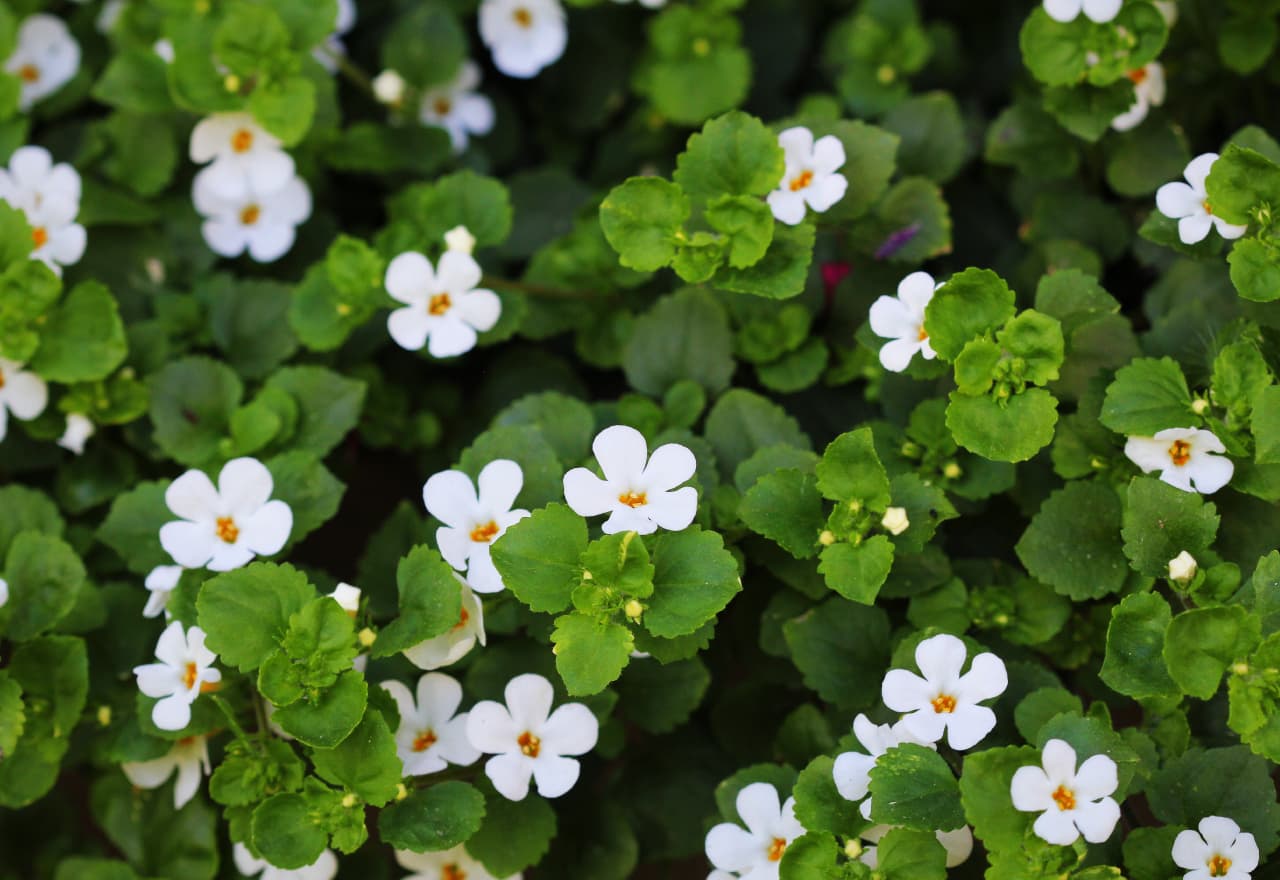
Bacopa monnieri, also known as Brahmi, is a perennial herb that has been used for centuries in Ayurveda, the traditional wellness system of India. It is well-regarded for its cognitive enhancing properties and its ability to improve memory, concentration, and overall mental clarity.
The history of Bacopa monnieri as a nootropic and adaptogen traditional herbalism is rich and extensive. It has been used by Ayurvedic practitioners for thousands of years as well as in today's complementary and integrative health practices to enhance memory, improve learning, and promote overall brain health.
In addition to its cognitive benefits, Bacopa monnieri was also suggested in a systematic review to have calming properties, helping to reduce anxiety and stress.(6)
Its ability to enhance cognitive function, reduce stress, and improve overall vitality make it a valuable natural energy tonic. Whether used alone or in combination with other adaptogens, Bacopa monnieri may help to boost energy in both body and mind, leading to improved performance, focused thinking, healthy mood and overall well-being.
There are several theories behind how Bacopa monnieri may boost energy and improve performance, particularly in the realm of cognitive function.
Whereas Rhodiola is regarded as a vitality booster both physically and mentally, Bacopa is more often regarded as a brain energy-boosting adaptogen, with related cognitive performance benefits.
One of the primary active compounds in Bacopa monnieri is bacosides, which are believed to enhance the communication between neurons, improve synaptic activity of neurotransmitters, and promote the growth and maintenance of nerve endings. These effects may contribute to the herb's ability to improve memory, new learning, and overall cognitive function.(7)
Bacopa monnieri is also believed to have antioxidant properties, with cell protective activity that defends the brain from oxidative stress and assist with issues related to age-related cognitive decline. Additionally, the herb may modulate the activity of certain neurotransmitters, including acetylcholine, which plays a key role in memory and learning.
Learn more about Bacopa Monnieri
Prefer steady brain energy over stimulant spikes?
Experience a Research-Backed Energizing Brain Supplement
Mind Lab Pro® is the world's most effective nootropic supplement. It is scientifically shown to enhance brain function.(8,9) It supplies two major adaptogens -- Rhodiola rosea and Bacopa monnieri -- for their ability to erase mental fatigue and optimize cognitive performance.
-
Focus, clarity, speed of thought
-
100% safe, clean, plant-based
-
Supplies adaptogens Rhodiola & Bacopa
-
Natural energy boost in the brain
-
30 day money back guarantee
-
11 brain supplements in 1 formula
I was skeptical at first, but I can say that I feel sharper and more clear minded than as long as I can remember.John Y

Cordyceps
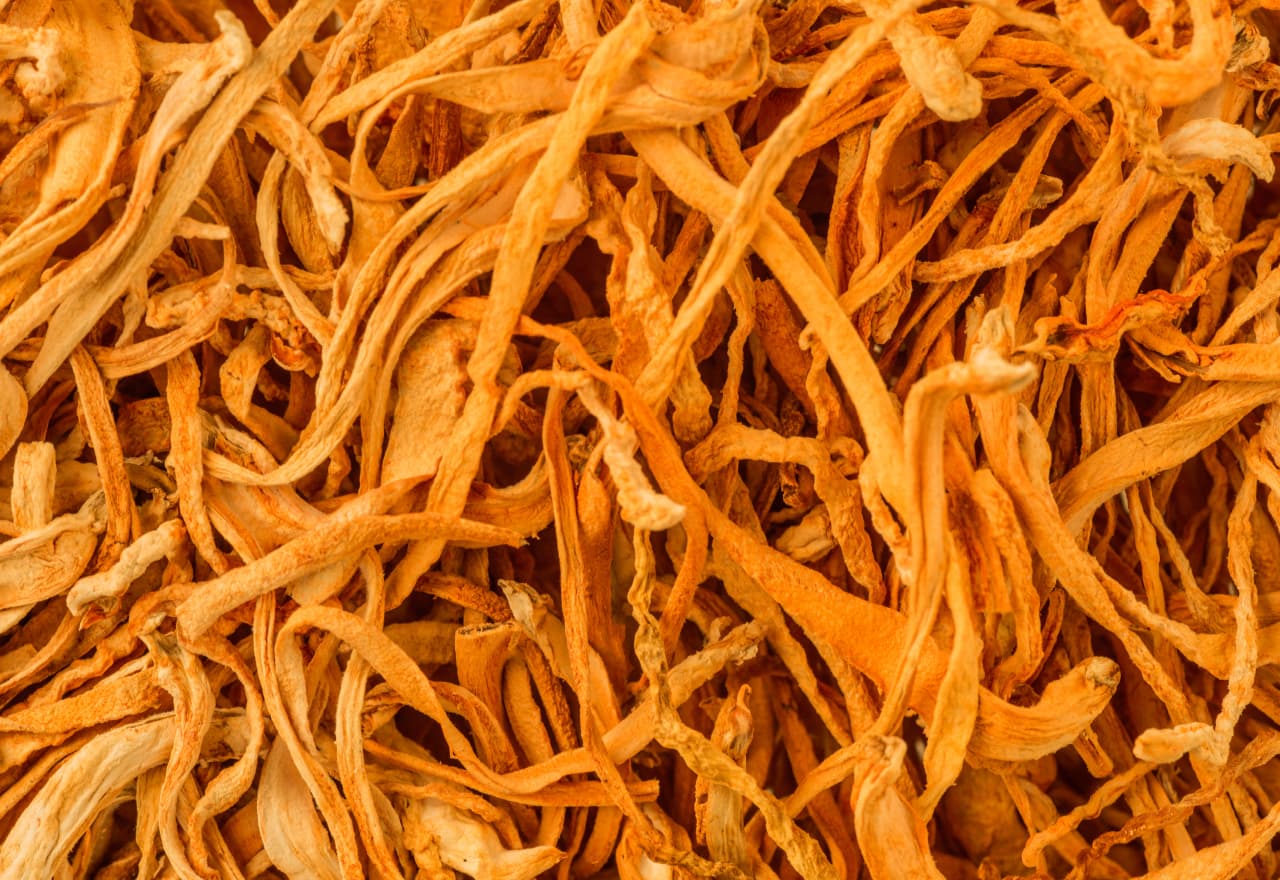
Cordyceps (Cordyceps sinensis) is one of the best mushroom adaptogens, known for growing on caterpillars. Found in the far east, it is associated with traditional Asian herbalism practices.
Its mycelium ("mushroom roots") enter the caterpillar to get nourishment and grow. The fungus feeds on the caterpillar insides and leaves a sort of mummified "husk" from which the fruiting body eventually emerges.
Ancient Chinese herbal texts report cordyceps may have varied health benefits, including enhancing performance in body and mind, boosting energy levels, supporting cardiovascular function and even helping with anti-aging efforts.
As an energizing adaptogen, cordyceps is most often associated with athletic performance.
Emerging research backs cordyceps' potential to both enhance exercise capacity and strengthen the body's resistance to fatigue during both aerobic and anaerobic exercise. Researchers have suggested may have a few mechanisms of action that benefit athletes:
-
Stimulates mitochondrial ATP energy generation while helping protect mitochondria from free radical damage, dual activities that combine to promote and maintain physical power;(10)
-
Enhances cell oxygen utilization, promoting efficient physical performance that may improve aerobic exercise capacity and extend time to exhaustion.(11)
-
Cordyceps can also help enhance lactic acid metabolism, thus helping to reduce fatigue associated with exercise, making physical activities less challenging.(12)
In summary, cordyceps has been suggested to help reduce fatigue, improve circulation, and boost the function of the immune and respiratory system.
Ashwagandha

Ashwagandha (Withania somnifera) is likely one of the most recognized stress relief herbs on this list. This herb is one of the most powerful Ayurvedic adaptogens for energy, making it one of the most important herbs for vitality in India.
In addition to being one of the most famous adaptogens, Ashwagandha is considered an herb for Rasayana practices that promote youthful vigor, strength and longevity, as well as enhanced overall performance.
Ashwagandha (Withania somnifera) is often utilized for its potential to enhance physical energy, vitality, vigor, and strength. Here's a summary of its benefits specifically related to these areas:
-
Energy and Vitality Boost: Ashwagandha is known to support adrenal function, helping to combat fatigue and increase energy levels. Its adaptogenic properties may help the body utilize energy more efficiently during both stress and rest.
-
Stress Resistance: By regulating the body's stress response, ashwagandha can help maintain energy levels. It reduces the levels of cortisol, a hormone that can deplete energy when chronically elevated due to stress.
-
Improved Physical Performance: Some studies have suggested that ashwagandha supplementation may enhance physical performance, including increased cardiorespiratory endurance and improved muscle strength and recovery, which is vital for athletes and those engaged in physical training.
-
Vigor and Strength: Ashwagandha has traditionally been used to strengthen the body and is believed to enhance muscle mass and strength, which can be beneficial for overall physical vigor.
-
Revitalization: In Ayurvedic practices, ashwagandha is often used to help rejuvenate the body, particularly after health issues or in cases of general weakness. It's believed to improve the body's resilience to physical and emotional stress, contributing to a feeling of robust health.
Modern researchers believe ashwagandha works by blocking the fatigue-inducing effects of stress hormones and exhibiting strong anti-stress adaptogenic activity.(13)
Beyond freeing energy from the grips of stress, ashwagandha has been shown to enhance sleep quality further helping to bolster energy levels.(14)
It has been used for centuries for boosting energy, improving concentration, and reducing stress. It is also thought to enhance physical performance, muscle strength, and cardiorespiratory endurance, making this an excellent herb for fighting fatigue and keeping energized.
Ginseng
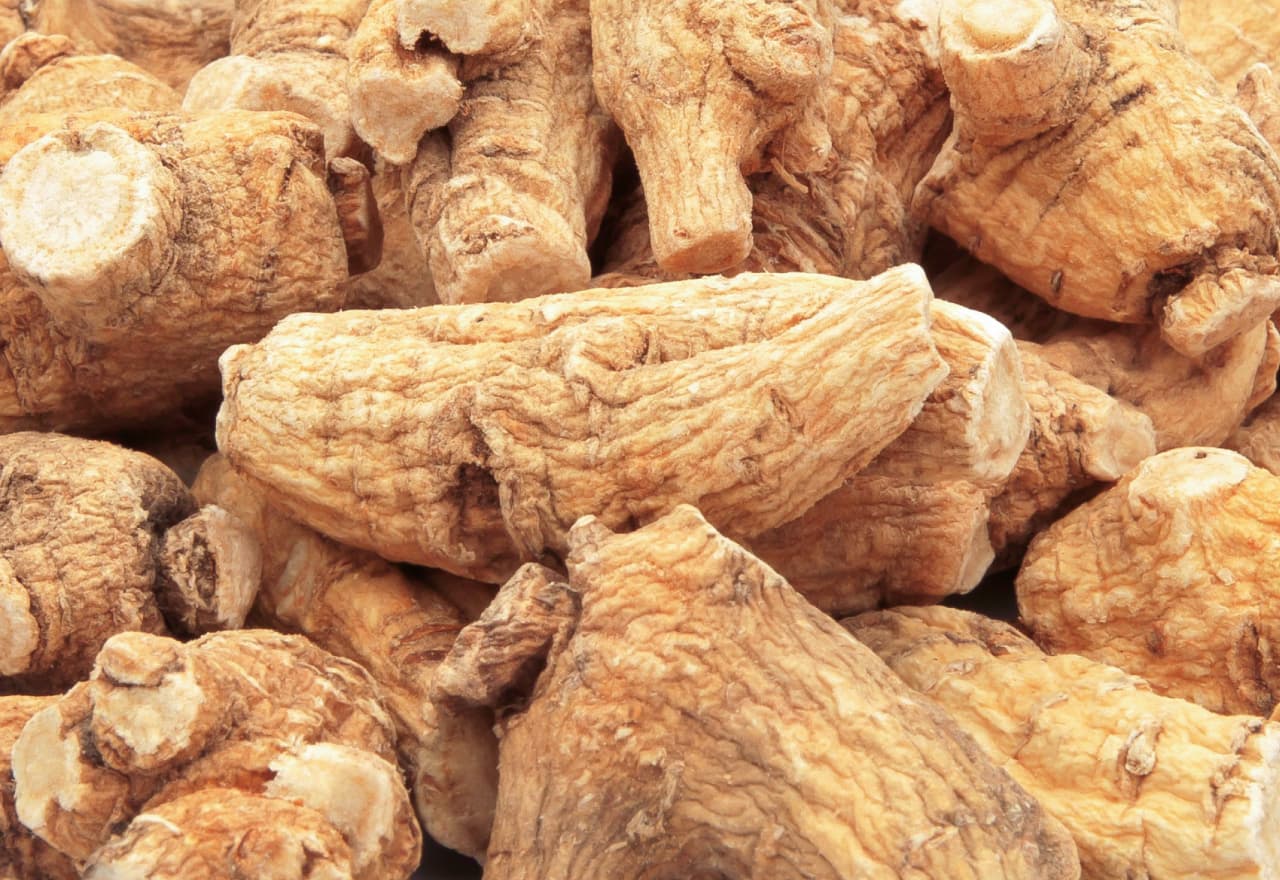
Panax ginseng is one of the major adaptogens used to help fight fatigue. Ginseng can help reduce mental fatigue on top of increasing both cognitive and physical performance.
Used in Asian wellness practices for thousands of years, Ginseng is a plant that boasts a root rich in ginsenosides, bioactive phytochemicals that are exclusive to plants within the Ginseng family.
There are many different types of Ginseng, as the plant naturally grows in temperate climates all over the Northern Hemisphere. The most popular varieties are Asian or Korean Ginseng and American Ginseng, with the former commonly used as an energizer and the latter prized for its stress-resistance properties.
In China, Korea, and the Far East, Panax Ginseng has been a mainstay of alternative wellness practices for generations, valued for its adaptogenic properties. In America, ginseng was used by Native Americans prior to Western settlement as a way to optimize immune responses, modulate inflammation, support digestion and promote healthy energy levels.
Ginseng has been steadily gaining popularity in Western wellness practices since the 1950s, thanks to research suggesting it may help with cognitive function, stamina and well-being.(15)
Modern research has shown that gineseng's ginsenosides influence many tissues throughout the body and perform a wide range of health-promoting biological activities, including antioxidant activities and immune system modulating activities.
In fact, there are no less than 25 different ginsenosides in Panax ginseng that have been discovered to date. The expansive activities of the many ginsenosides may account for ginseng's reputation as a "tonic" herb for promoting overall wellness and vitality in a number of different ways.
Ginseng is available in a variety of forms, including capsules, powders, liquid extract, and whole ginseng root, but is almost always derived from the root of the ginseng plant and is typically taken orally.
Ginseng preparation for nutritional supplementation comes in one of two major forms, known as either Red or White Ginseng. Red Ginseng is prepared by first steaming the ginseng root before heat drying, giving its distinctive "red" color, while White ginseng is simply left to dry. Asian or Korean Ginseng is most available as Red Ginseng, as it is the traditional method for its preparation.
Licorice Root (Glycyrrhiza glabra)

Licorice root, derived from the Glycyrrhiza glabra plant, has been one of the staple adaptogens in global health systems, including Chinese, Middle Eastern, and European herbal practices. It is well-known for its sweet flavor and various integrative health benefits, one of which includes the potential to support energy levels.(16)
The primary active compound in licorice root is glycyrrhizin, which has a structure somewhat similar to the adrenal corticosteroids. These are hormones produced by the adrenal glands that play a vital role in the body's response to stress. By influencing the adrenal gland's function, licorice root can aid in preserving the levels of these hormones, particularly cortisol.
In situations of chronic stress, the adrenal glands can become overtaxed, leading to a condition commonly known as adrenal fatigue, where the body's ability to respond to stress is diminished, often accompanied by a pervasive sense of tiredness. Licorice root can help prolong the half-life of cortisol in the body, thereby reducing the demand on the adrenal glands and helping to maintain energy and combat feelings of fatigue.
Furthermore, licorice root supports the endocrine system at large, which includes the orchestration of hormones that regulate metabolism and energy expenditure. By contributing to the balance of these hormones, licorice root can help stabilize energy levels and enhance overall vitality.
On a cellular level, licorice root may support the function of the digestive system, which is fundamental for the efficient absorption and utilization of nutrients — the very building blocks of energy. Licorice has been traditionally used to soothe gastrointestinal issues, which, when resolved, can lead to better digestion and, consequently, a more robust energy supply.
Licorice root also contains flavonoids and various phytochemicals with antioxidant properties, which protect the cells from oxidative damage and support the healthy function of the mitochondria, where cellular energy production occurs.
It's important to note, however, that while licorice root can support energy levels, its use should be monitored carefully. Excessive consumption of licorice or glycyrrhizin can lead to adverse effects, such as hypertension, edema, or hypokalemia (low potassium levels), due to its potent effect on the body's balance of water and electrolytes.
Therefore, licorice root should be used judiciously and is best consumed under the guidance of a knowledgeable herbalist or healthcare provider, particularly for those with high blood pressure, kidney disease, or those taking certain medications. In some cases, deglycyrrhizinated licorice (DGL) may be recommended, as it provides the benefits of licorice without the risk of increasing blood pressure or causing water retention.
Schisandra chinensis (Chinese Magnolia Vine)
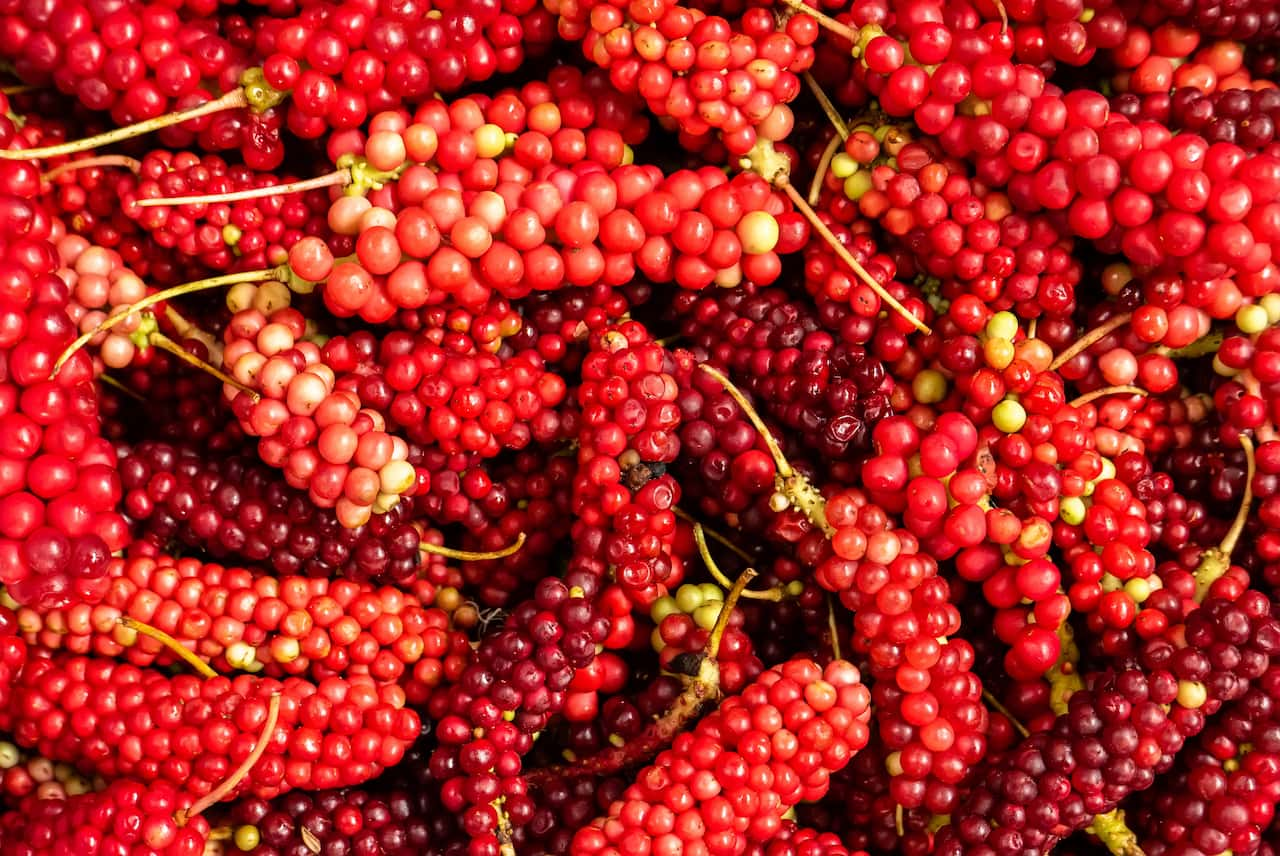
Schisandra (Schisandra chinensis) is one of the traditional Chinese adaptogens used as a general herbal tonic and to promote liver health.
Schisandra chinensis, known as the five-flavor fruit for its complex taste profile, is a revered berry in traditional Chinese medicine that is believed to harbor a unique capacity to boost energy levels and enhance physical performance.
The energy-boosting properties of Schisandra are anchored in its adaptogenic nature. In a nuanced interplay with the body's systems, Schisandra supports the adrenal glands — the stress regulating centers of the body. By modulating the release of stress hormones like adrenaline and cortisol, it ensures that the body doesn't succumb to the exhausting effects of chronic stress, which is often a thief of vitality.(17)
Schisandra also contributes to liver health, a critical aspect of energy metabolism. The liver is responsible for converting dietary nutrients into forms of energy that the body can readily use. By promoting liver function, Schisandra aids in optimizing this energy conversion process, thus supporting overall energy levels.
Another avenue through which Schisandra enhances energy is by stimulating the central nervous system.
This can lead to increased mental clarity and alertness, qualities that are often associated with a feeling of increased energy.
Furthermore, Schisandra is known to improve endurance and reduce fatigue. Athletes and physically active individuals may find that Schisandra increases their resistance to exhaustion during prolonged physical exertion, a testament to its reputation as a performance enhancer.
The berry is also credited with antioxidant properties, which play a role in mitochondrial protection. Mitochondria are the cellular powerhouses where energy is produced, and their well-being is essential for sustained energy production. Antioxidants help neutralize free radicals that can damage these vital organelles, ensuring that energy synthesis within the cell remains efficient.
Incorporating Schisandra into one's lifestyle is often done with the aim of not just spiking energy levels temporarily, but rather nurturing a deep-seated pool of vitality that can be drawn upon over time. It is a holistic approach to energy, supporting the body's natural rhythms and enhancing its ability to perform and endure.
As with all potent botanicals, Schisandra should be embraced with an understanding of its comprehensive effects on the body and mind, and it's always prudent to consult with a healthcare professional or a knowledgeable herbalist before beginning any new herbal regimen, particularly for those with underlying health conditions or those who are pregnant or nursing.
Holy Basil (Ocimum sanctum, also known as Tulsi)
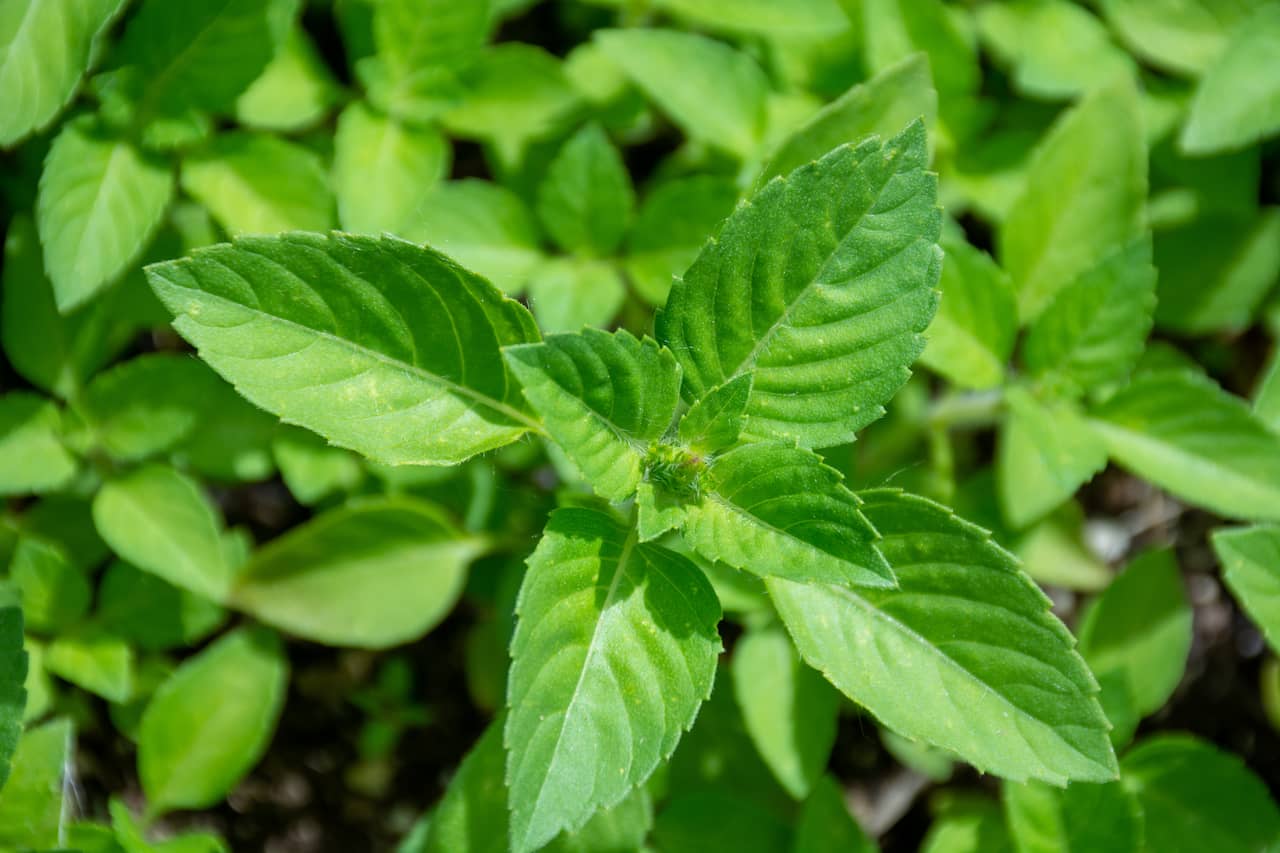
Holy Basil, also known as Tulsi (Ocimum sanctum), is a sacred herb in Ayurvedic traditions, highly regarded for its holistic healing properties. While not typically touted as an energy booster in the conventional sense, Holy Basil has a multifaceted influence on the body and mind that can indirectly contribute to improved energy levels.
By mitigating the impact of stress hormone cortisol, Holy Basil helps maintain a state of balance and equilibrium in the body. This reduction in stress can prevent the energy dips that often accompany prolonged periods of stress or anxiety, leading to a more consistent and stable energy availability throughout the day.
One of the ways Holy Basil supports energy is through its effect on the body's sleep cycle. By promoting a more relaxed state of mind and easing anxiety, Holy Basil can improve sleep quality.(18) Better sleep is intrinsically linked to improved energy levels during waking hours, as the body is able to repair and restore itself more effectively at night.
Holy Basil also has a positive influence on blood sugar regulation. By aiding in the control of blood sugar levels, Holy Basil can regulate the spikes and crashes that often lead to fluctuations in energy. Maintaining steady blood sugar is essential for consistent energy levels and mood.
The herb's antioxidant properties contribute to the protection of mitochondrial function, the energy powerhouses within our cells. By safeguarding these structures from oxidative stress, Holy Basil helps ensure that the body's cells are energetically efficient.
Moreover, Holy Basil supports liver function, an organ pivotal to detoxification and energy production. A healthy liver ensures the efficient conversion of food into usable forms of energy and the storage of energy reserves.
While Holy Basil does not directly serve as a stimulant, its overall restorative impact on the body can lead to increased physical and mental endurance. This can manifest as an enhanced ability to perform tasks without feeling fatigued, an improvement in mental clarity, and a more resilient stress response.
Integrating Holy Basil into one's daily wellness routine can be viewed as tuning the body's innate mechanisms, akin to winding a natural clock that dictates the rhythms of rest and activity.
I was skeptical at first, but I can say that I feel sharper and more clear minded than as long as I can remember.John Y

Astragalus Root (Astragalus membranaceus)
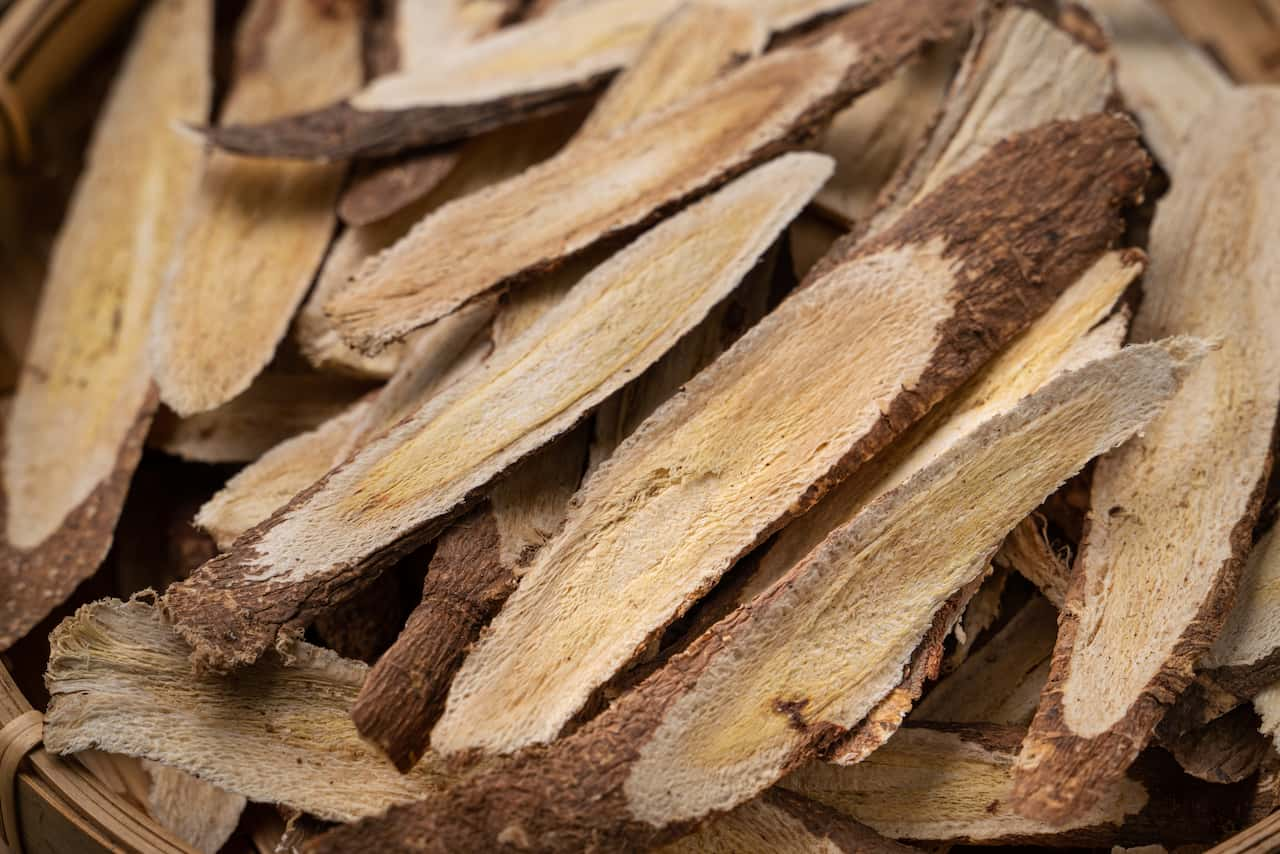
Astragalus is a storied herb in the annals of traditional herbalism, particularly within the ancient practices of Traditional Chinese wellness, where it is known as Huang Qi. This herb is revered not just as a gentle tonic but as a dynamic force that contributes to the sustenance and enhancement of energy levels.
In the body's constant battle against fatigue, Astragalus stands as an ally, wielding its adaptogenic qualities to bolster the body's innate vitality. Its role in energy metabolism is crucial; it supports the transformation of food into energy, enhancing the body's efficiency in using nutrients to fuel cellular processes. This is not through a jolt of stimulation, as one might experience with caffeine, but through a sustained support of the body's core energy-producing systems.
The energy-promoting effects of Astragalus are deeply rooted in its ability to fortify the immune system.(19) A robust immune defense is less taxed by pathogens and can preserve the body's energy reserves for daily activities.
Furthermore, Astragalus has been found to encourage increased blood flow and improve heart function, ensuring that tissues throughout the body are well-nourished and oxygenated, prerequisites for the generation of energy at the cellular level.
In the realm of physical endurance and strength, Astragalus shows promise in enhancing the body's stamina, thereby allowing for prolonged physical activity without a corresponding increase in fatigue. This is particularly beneficial for those looking to improve their physical performance or who are recovering from illness.
The herb's influence also extends to the subtle energy systems of the body. By stabilizing the body's response to stress and aiding in the recovery from the demands of daily life, Astragalus helps maintain a steady stream of energy. Its components actively combat the fatigue associated with stress, ensuring that the individual can face the challenges of the day with renewed vigor.
Mind Lab Pro® is an Adaptogen-Enhanced Nootropic Supplement
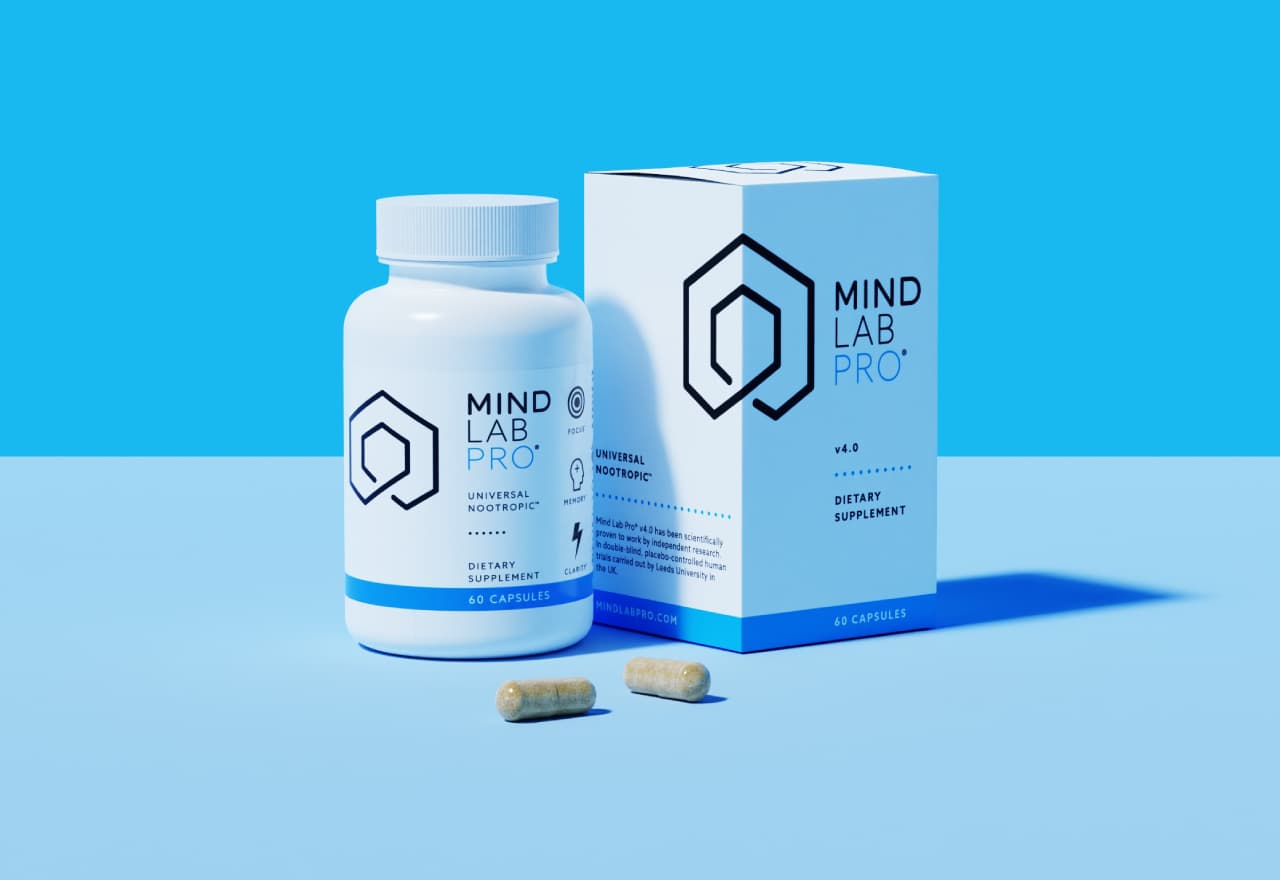
All of the adaptogens discussed in this article are available in supplement form. Adaptogen supplements may be presented as single-ingredient products or multi-ingredient stacks.
If you are seeking an adaptogen supplement for brain energy, mental performance and more, Mind Lab Pro is a top pick to consider.
A brain-boosting nootropic supplement, MLP features two standardized, premium-quality adaptogen herbs:
-
Rhodiola rosea, 50 mg (Standardized to 3% rosavins and 1% salidrosides)
-
Bacopa monnieri, 150 mg (full-spectrum extract, 24% bacosides with 9 bioactives)
This combination provides support for stress resistance, natural energy, cognitive function and much more. But it's just one aspect of this far-reaching formula. The full MLP ingredients list:
-
Citicoline, 250 mg
-
Phosphatidylserine (PS), 100 mg
-
Bacopa monnieri, 150 mg (full-spectrum extract, 24% bacosides with 9 bioactives)
-
Organic Lion's Mane Mushroom, 500 mg (fruit and mycelium)
-
Maritime Pine Bark Extract, 75 mg: (Standardized to 95% proanthocyanidins)
-
N-Acetyl L-Tyrosine, 175 mg
-
L-Theanine, 100 mg
-
Rhodiola rosea, 50 mg (Standardized to 3% rosavins and 1% salidrosides)
-
NutriGenesis® B-Vitamins: Vitamin B6 (2.5 mg), Vitamin B9 (100 mcg), Vitamin B12 (7.5 mcg)
With these 11 nootropics, MLP can assist with virtually all aspects of mental performance, including:
-
Adaptogenic energizing and stress protective activity
-
Focus, concentration and attention support
-
Natural energy without caffeine; stress-free vitality
-
Effective cognition while multitasking and under stress
-
All types of memory support: recall, long-range, short-term, learning
-
Helps to promote mental clarity
-
Mood support: nourishes brain chemicals for balanced, bright outlook
Mind Lab Pro® is Backed by Research.
Finally, MLP is the best nootropic stack on the market today because it's one of the only ones backed by rigorous clinical human trials. In this research, it was shown to improve brain function across several key cognitive markers.
-
In one study, researchers reported that subjects taking Mind Lab Pro for 30 days experienced significant improvements (when compared to those taking placebo) in performing information processing tasks, especially in pressure-filled environments that require quick decision-making.
-
A second study found that subjects taking Mind Lab Pro demonstrated significant improvements across all memory functions that were tested, including auditory, visual, visualization, immediate and delayed recall memory.
MLP® is also premium quality. All its nootropics are research-backed, with clean labels (no GMOs, gluten, artificial additives, or caffeine) and strong customer service support. Learn More about Mind Lab Pro® Quality
Pricing & Shipping
-
1 Bottle (one month supply): $69 ($2.30/serving)
-
2 bottles (two month supply): $138 ($2.30/serving)
-
Best deal: 3 bottles + 1 free, with free shipping: $207 ($1.73/serving)
-
All covered by 30-day money back guarantee

Conclusion
In conclusion, the world of adaptogen supplements offers a fascinating array of natural remedies that have been used for centuries to boost energy, banish physical fatigue, balance cortisol levels and improve overall well-being.
From the rejuvenating properties of Ashwagandha to the stress-reducing effects of Rhodiola Rosea, each of these top 10 adaptogens brings its unique benefits to the table.
Incorporating these natural substances into your daily routine can be a holistic approach to enhancing your energy levels and coping with the stresses of modern life.
However, as with any supplement, it's crucial to consult with a healthcare professional to ensure they are right for your individual health needs before taking adaptogens in capsule form.
Scientific References
-
Hung SK, Perry R, Ernst E. The effectiveness and efficacy of Rhodiola rosea L.: a systematic review of randomized clinical trials. Phytomedicine. 2011 Feb 15;18(4):235-44. doi: 10.1016/j.phymed.2010.08.014. Epub 2010 Oct 30. PMID: 21036578.
-
Olsson EM, von Schéele B, Panossian AG. A randomised, double-blind, placebo-controlled, parallel-group study of the standardised extract shr-5 of the roots of Rhodiola rosea in the treatment of subjects with stress-related fatigue. Planta Med. 2009 Feb;75(2):105-12. doi: 10.1055/s-0028-1088346. Epub 2008 Nov 18. PMID: 19016404.
-
Panossian A, Wagner H. Stimulating effect of adaptogens: an overview with particular reference to their efficacy following single dose administration. Phytother Res. 2005 Oct;19(10):819-38. doi: 10.1002/ptr.1751. PMID: 16261511.
-
De Bock K, Eijnde BO, Ramaekers M, Hespel P. Acute Rhodiola rosea intake can improve endurance exercise performance. Int J Sport Nutr Exerc Metab. 2004 Jun;14(3):298-307. doi: 10.1123/ijsnem.14.3.298. PMID: 15256690.
-
Darbinyan V, et al. Rhodiola rosea in stress induced fatigue--a double blind cross-over study of a standardized extract SHR-5 with a repeated low-dose regimen on the mental performance of healthy physicians during night duty. Phytomedicine. 2000 Oct;7(5):365-71. Doi: 10.1016/S0944-7113(00)80055-0
-
Walker EA, Pellegrini MV. Bacopa monnieri. [Updated 2023 Mar 17]. In: StatPearls [Internet]. Treasure Island (FL): StatPearls Publishing; 2023 Jan-.
-
Roodenrys S, et al. Chronic effects of Brahmi (Bacopa Monnieri) on human memory. Neuropsychopharmacology. 2002 Aug;27(2):279-81
-
Utley A, Gonzalez Y, Imboden CA. The Efficacy of A Nootropic Supplement on Information Processing in Adults: A Double Blind, Placebo Controlled Study. Biomed J Sci & Tech Res 49(1)-2023. BJSTR. MS.ID.007746
-
Abbott-Imboden C., Gonzalez Y., Utley A. (2023). Efficacy of the nootropic supplement Mind Lab Pro on memory in adults: Double blind, placebo-controlled study. Human Psychopharmacology: Clinical and Experimental, e2872. https://doi.org/10.1002/hup.2872
-
Li XT, Li HC, Li CB, Dou DQ, Gao MB. Protective effects on mitochondria and anti-aging activity of polysaccharides from cultivated fruiting bodies of Cordyceps militaris. Am J Chin Med. 2010;38(6):1093-106. doi: 10.1142/S0192415X10008494. PMID: 21061463.
-
Singh M, Tulsawani R, Koganti P, Chauhan A, Manickam M, Misra K. Cordyceps sinensis increases hypoxia tolerance by inducing heme oxygenase-1 and metallothionein via Nrf2 activation in human lung epithelial cells. Biomed Res Int. 2013;2013:569206. doi: 10.1155/2013/569206. Epub 2013 Aug 26. PMID: 24063008; PMCID: PMC3770031.
-
Hirsch KR, Smith-Ryan AE, Roelofs EJ, Trexler ET, Mock MG. Cordyceps militaris Improves Tolerance to High-Intensity Exercise After Acute and Chronic Supplementation. J Diet Suppl. 2017 Jan 2;14(1):42-53. doi: 10.1080/19390211.2016.1203386. Epub 2016 Jul 13. PMID: 27408987; PMCID: PMC5236007.
-
Chandrasekhar K, Kapoor J, Anishetty S. A prospective, randomized double-blind, placebo-controlled study of safety and efficacy of a high-concentration full-spectrum extract of ashwagandha root in reducing stress and anxiety in adults. Indian J Psychol Med. 2012 Jul;34(3):255-62. doi: 10.4103/0253-7176.106022. PMID: 23439798; PMCID: PMC3573577.
-
Cheah KL, Norhayati MN, Husniati Yaacob L, Abdul Rahman R. Effect of Ashwagandha (Withania somnifera) extract on sleep: A systematic review and meta-analysis. PLoS One. 2021 Sep 24;16(9):e0257843. doi: 10.1371/journal.pone.0257843. PMID: 34559859; PMCID: PMC8462692.
-
Ratan ZA, Haidere MF, Hong YH, Park SH, Lee JO, Lee J, Cho JY. Pharmacological potential of ginseng and its major component ginsenosides. J Ginseng Res. 2021 Mar;45(2):199-210. doi: 10.1016/j.jgr.2020.02.004. Epub 2020 Mar 25. PMID: 33841000; PMCID: PMC8020288.
-
Wahab S, Annadurai S, Abullais SS, Das G, Ahmad W, Ahmad MF, Kandasamy G, Vasudevan R, Ali MS, Amir M. Glycyrrhiza glabra (Licorice): A Comprehensive Review on Its Phytochemistry, Biological Activities, Clinical Evidence and Toxicology. Plants (Basel). 2021 Dec 14;10(12):2751. doi: 10.3390/plants10122751. PMID: 34961221; PMCID: PMC8703329.
-
Kopustinskiene DM, Bernatoniene J. Antioxidant Effects of Schisandra chinensis Fruits and Their Active Constituents. Antioxidants (Basel). 2021 Apr 18;10(4):620. doi: 10.3390/antiox10040620. PMID: 33919588; PMCID: PMC8073495.
-
Lopresti AL, Smith SJ, Metse AP, Drummond PD. A randomized, double-blind, placebo-controlled trial investigating the effects of an Ocimum tenuiflorum (Holy Basil) extract (HolixerTM) on stress, mood, and sleep in adults experiencing stress. Front Nutr. 2022 Sep 2;9:965130. doi: 10.3389/fnut.2022.965130. PMID: 36185698; PMCID: PMC9524226.
-
Wang P, Wang Z, Zhang Z, Cao H, Kong L, Ma W, Ren W. A review of the botany, phytochemistry, traditional uses, pharmacology, toxicology, and quality control of the Astragalus memeranaceus. Front Pharmacol. 2023 Aug 23;14:1242318. doi: 10.3389/fphar.2023.1242318. PMID: 37680711; PMCID: PMC10482111.

